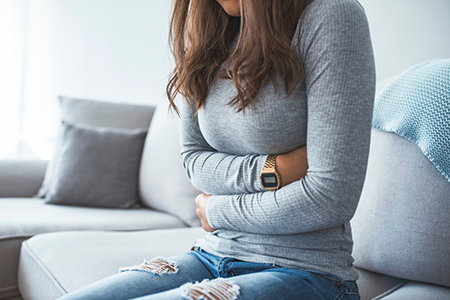 Endometriosis happens when the tissue that lines your uterus, known as the endometrium, starts to grow outside of your uterus. This tissue may grow on other female pelvic organs, such as your ovaries or fallopian tubes. But it can also spread to other nearby organs, like the bladder or bowel.
Endometriosis happens when the tissue that lines your uterus, known as the endometrium, starts to grow outside of your uterus. This tissue may grow on other female pelvic organs, such as your ovaries or fallopian tubes. But it can also spread to other nearby organs, like the bladder or bowel.
It’s a fairly common condition and one of the many causes of pelvic pain. In fact, as many as 11% of women of childbearing age have endometriosis, according to the Office on Women’s Health. That’s why it’s important to know the typical warning signs of the condition—and when you should talk to your OB GYN.
Pelvic pain
Most women with endometriosis experience some type of pain. You may have pelvic pain or pain in your lower abdomen or back. Some women also have pain associated with sex. Often, pain is worse during your period.
Because numerous conditions cause pelvic pain in women, any ongoing pelvic pain warrants a visit with your doctor. Some causes of pain, like endometriosis, are related to your gynecologic health. But other conditions outside your female pelvic organs can cause pain too.
To help pinpoint the exact cause, your OB GYN may use several tests. These could include a physical exam, urine tests, Pap smear, or pelvic ultrasound to rule out other causes.
Period changes
Several symptoms related to your period may also be a sign of endometriosis. The condition can cause heavy, painful periods. Women with endometriosis may notice severe menstrual cramps that aren’t managed with over-the-counter pain relievers.
The Endometriosis Foundation of American says it’s also common to have longer menstrual periods—lasting more than seven days. Some women may have problems with other period irregularities. This can include spotting and bleeding between periods.
Again, because period changes are caused by many different conditions, it’s best to talk with your OB GYN. He or she can help determine whether your symptoms are a result of endometriosis or something else.
Bladder or bowel issues
Digestive or urinary symptoms are also common with endometriosis. This is especially true when tissue growths occur along the bladder or digestive system.
The National Institutes of Health says endometriosis may cause symptoms that are mistaken for a bowel condition. You may have constipation, diarrhea, bloating, or nausea. If endometriosis affects your bladder, you may feel an urgency to use the bathroom. Or you may have painful urination. With endometriosis, these symptoms are often significantly worse during your period.
If you’re experiencing bladder or bowel symptoms, you may start with your primary care physician. However, it’s worth telling your OB GYN as well. This allows him or her to get a full picture of your health and check for a gynecologic cause of your symptoms, including endometriosis.
Infertility
Even if you aren’t experiencing other major symptoms, endometriosis has a connection with infertility. The American Society for Reproductive Medicine estimates between 25% to 50% of women who are infertile have endometriosis. So, if you’re having trouble getting pregnant, it’s likely your OB GYN will check for this condition.
If your doctor diagnoses you with endometriosis, it doesn’t mean you can't have children. Many women with the condition go on to have healthy pregnancies. Others may need extra treatment or fertility assistance to have a successful pregnancy.
An OB GYN who is board-certified in reproductive endocrinology and infertility often gives you the help you need. OB GYNs with this board certification specialize in care for women with many conditions affecting conception and pregnancy, including endometriosis.
Get care for your symptoms
From infertility to painful symptoms, endometriosis requires specific care based on your unique needs. If you’re having any symptoms, talk to your OB GYN sooner than later. Several options are available to help find the source of your symptoms. If you do have endometriosis, your OB GYN can then offer treatments to help get pain or other symptoms under control.
